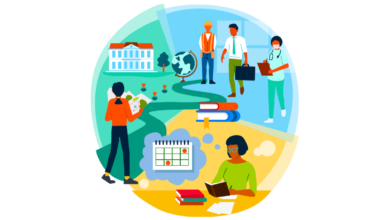The Future of Open Educational Resources and Digital Libraries
The rise of digital technology has transformed the way we learn, making education more accessible and flexible. With the advent of Open Educational Resources (OERs) and digital libraries, learners and educators now have access to a wealth of information and resources from anywhere in the world. This article explores the future of OERs and digital libraries, discussing their potential to revolutionize education and the challenges they face.
Introduction
The introduction provides a brief overview of the topic and sets the stage for the rest of the article. It should capture the reader’s attention and provide a clear thesis statement.
The Impact of Digital Technology on Education
The rapid development of digital technology has had a significant impact on education, providing new opportunities for learning and teaching. With the widespread availability of high-speed internet, learners and educators can access a vast range of resources, including multimedia content, online courses, and educational software.
The Advantages of OERs and Digital Libraries
This section explores the benefits of OERs and digital libraries and how they are transforming education.
Increased Access to Education
One of the primary advantages of OERs and digital libraries is that they make education more accessible. With OERs, learners can access high-quality educational materials for free, removing the financial barriers to learning. Digital libraries, on the other hand, provide a vast collection of resources, including books, articles, and multimedia content, that can be accessed from anywhere in the world.
Customizable Learning Experience
OERs and digital libraries provide learners with the flexibility to customize their learning experience. Learners can choose the resources that best suit their needs, learning style, and interests, making the learning process more engaging and effective.
Collaborative Learning
OERs and digital libraries promote collaborative learning, enabling learners to connect with peers and educators from around the world. This collaborative approach fosters a sense of community and encourages the exchange of ideas and knowledge.
The Challenges Facing OERs and Digital Libraries
Despite their many benefits, OERs and digital libraries face significant challenges that may hinder their widespread adoption. This section explores some of these challenges and potential solutions.
Copyright and Intellectual Property
One of the most significant challenges facing OERs and digital libraries is copyright and intellectual property laws. The reuse and distribution of copyrighted materials require permission from the copyright owner, which can be challenging to obtain.
Quality Control
Ensuring the quality of OERs and digital libraries is a significant challenge. The lack of oversight and quality control measures can result in the distribution of inaccurate or misleading information.
Funding
The sustainability of OERs and digital libraries is a critical challenge. The development, maintenance, and hosting of these resources require significant financial resources, which may not be readily available.
The Future of OERs and Digital Libraries
Despite the challenges, the future of OERs and digital libraries looks bright. This section explores some of the trends and innovations that are shaping the future of education.
Personalization and Adaptive Learning
Personalization and adaptive learning technologies are transforming the way we learn. These technologies use machine learning algorithms to analyze learners’ behavior and adjust the learning experience accordingly.
Open Data
Open data initiatives are providing learners and educators with access to vast amounts of data that can be used for research and analysis.
Blockchain Technology
Blockchain technology has the potential to revolutionize education by providing a decentralized, transparent, and secure platform for storing and sharing educational records and credentials.




